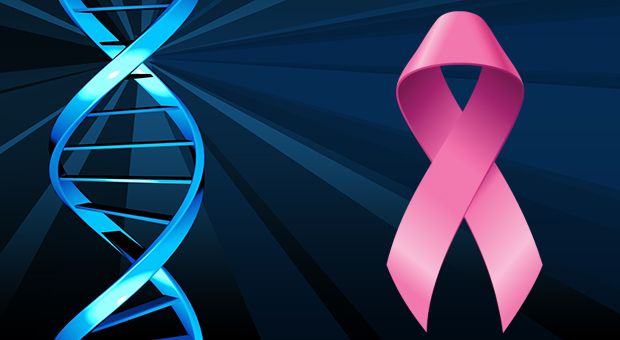
Hereditary Breast Cancer
While there are many different factors that can lead to breast cancer, about 5% to 10% of breast cancers are hereditary. Hereditary cancer means cancer runs in your family and could be caused by a change in certain genes that you inherited from your mother or father.
Genes act as instructions and contain information to build and maintain cells in the body. Humans inherit one set of genes from their mother and one set of genes from their father. Genes are made up of DNA. DNA tells the body what traits will be passed on from parents to children, such as blood type, hair color, eye color, and risks of getting certain diseases.
BRCA Genes
BRCA1 and BRCA2 are two genes that are important to fighting cancer. They are tumor suppressor genes. When they work normally, these genes help keep breast, ovarian, and other types of cells from growing and dividing too rapidly or in an uncontrolled way.
Sometimes a change or mutation occurs in the BRCA genes that prevent them from working normally. This raises a person's risk for breast cancer.
BRCA Gene Mutations
Sometimes, changes or "mutations" occur that prevent genes from functioning properly. Certain mutations in the BRCA genes make cells more likely to divide and change rapidly, which can lead to cancer.
All women have BRCA1 and BRCA2 genes, but only some women have mutations in those genes. About 1 in every 500 women in the United States has a mutation in either her BRCA1 or BRCA2 gene. If either your mother or your father has a BRCA1 or BRCA2 gene mutation, you have a 50% chance of having the same gene mutation.
Why These Mutations Matter
Not every woman who has a BRCA1 or BRCA2 gene mutation will get breast cancer but having a gene mutation increases the risk.
About 50 out of 100 women with a BRCA1 or BRCA2 gene mutation will get breast cancer by the time they turn 70 years old, compared to only 7 out of 100 women in the general United States population.
Women with a family history of breast cancer or inherited changes in their BRCA1 and BRCA2 genes may have a higher breast cancer risk. If this includes you, it is vital that you know your family history and talk to your doctor about screening and other ways you can lower your risk.
The best defense against breast cancer remains early detection - annual mammograms. The American Cancer Society recommends annual screening mammograms for all women at average risk beginning at age 40. If your doctor believes you are at an increased risk for breast cancer, he or she may recommend beginning screenings earlier or screening more often.
Summit Medical Group provides mammography services at three locations: Cedar Bluff, Fountain City, and Wellington/Deane Hill. Call (865) 588-8005 today to schedule a screening.
